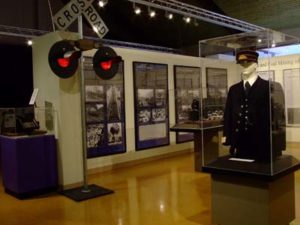 HIST 6310: MUSEUM STUDIES
HIST 6310: MUSEUM STUDIES
Fall 2017
Instructor: Dr. Karen L. Cox
Office: 122A Garinger Hall Office hours: 5-6:15 Tuesday and by appointment
Phone: 704.687.6231
Email: kcox@uncc.edu (best way to contact to make appointments)
Course Description: This course introduces students to the history and purposes of museums in the U.S. It also explores the ways in which museums in the U.S. exhibit local history and memory and asks that students discover this on their own by visiting area museums and historic sites. Finally, the course offers a particular challenge to students to research, design, and present a public history project for a community organization—in our case, the Charlotte Museum of History.
Books (Required)
Mary Hoffschwelle, The Rosenwald Schools of the American South
______, Preserving Rosenwald Schools, (PDF)
Beverly Serrell, Exhibit Labels: An Interpretive Approach (2nd edition)
Freeman Tilden, Interpreting Our Heritage (4th edition)
Stephen Weil, Making Museums Matter
Lawrence Weschler, Mr. Wilson’s Cabinet of Wonder: Pronged Ants, Horned Humans, Mice on Toast, and Other Marvels of Jurassic Technology
Instructor Expectations of Students
ATTENDANCE AND PARTICIPATION are essential. Students are expected to attend class, arrive on time, read all assigned readings, and contribute to the discussion in a substantive way that demonstrates your understanding of the readings.
- Keep up with all assignments on the course schedule. Turn assignments in at the day/time specified. Deadlines are final.
- Turn off cell phones and any other electronic devices that disrupt the class or distract your peers.
- You may take notes on a laptop or tablet during class, but you should not be surfing the web.
- You must save all of your returned assignments and carefully read the critiques therein.
- Students should communicate with the professor about their progress and/or problems they might be having over the course of the semester.
Students with Disabilities
Students who need accommodations should arrange a meeting with me during the first week of classes or as soon as possible. To set up a meeting, contact me via email and bring a copy of your Accommodation Letter to the meeting.
Non-Discrimination Statement
I strive for a class environment in which everyone regardless of their age, race, gender, religion, disability, sexual orientation, gender identity, or national origin feels included and free to express themselves.
Grading policy: Grading for this course is based on a 10-point scale, such that (A=90-100; B=80-89; C=70-79, and so on). However, individual assignments will be provided with a numerical grade, based on the following (A+=98-100; A=94-97; A-=90-93; B+=88-89; B=84-87, and so on). Thus, your course average could be a 90, but would appear on your transcript as an “A.”
All written assignments will be graded for clarity of composition and grammar as well as content. All assignments must be typed using Times New Roman 12-point font, and be double-spaced with one-inch margins. Since this is a history course, your citations must meet the guidelines established in The Chicago Manual of Style, which is available in the library, although you may use this link to get the basics. Also, please note that plagiarism is not tolerated. Those who violate this rule run the risk of failing the assignment or the class.
Paper: The role of museums 15%
Exhibit review 20%
Review of The Rosenwald Schools of the American South 20%
Class Participation/Discussion 10%
Lead Discussion 5%
Class Project 30%
Class Participation/Discussion: Because this class functions as a seminar and not a lecture course, important emphasis is placed on student discussion of the reading and will count as 15% of your grade. Students are required to bring the book under discussion. It is not enough to just talk. Discussion must be substantive and related to the reading. Each student will help lead discussion, but likely in pairs. You will, however, be graded individually.